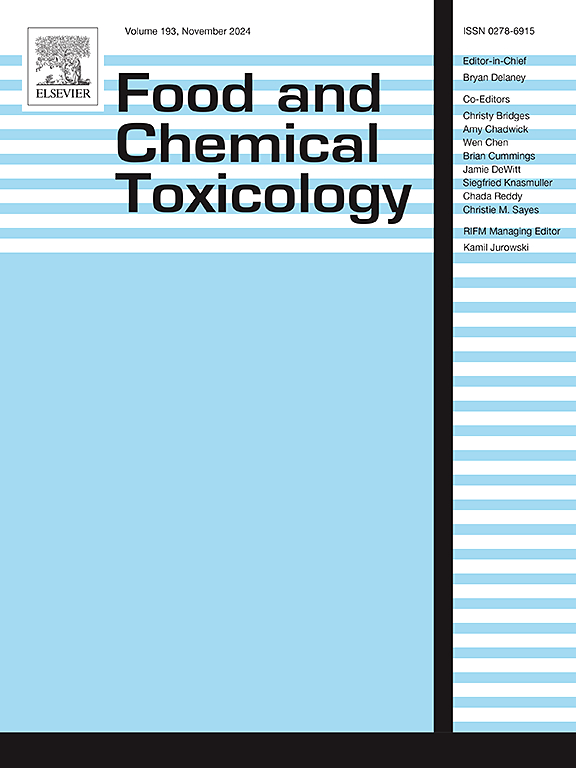山梨醇通过增加大鼠JAK1/STAT3、氧化应激和炎症诱导亚慢性肾毒性
IF 3.9
3区 医学
Q2 FOOD SCIENCE & TECHNOLOGY
引用次数: 0
摘要
山梨醇(SOR)是一种天然的食品甜味剂,广泛用于糖果、巧克力、饼干和果酱中。SOR对除肾组织外的其他器官均有毒性作用。因此,本研究旨在评估SOR对肾组织的亚慢性肾毒性作用。将36只sd大鼠分为对照组、SOR (20 mg/kg)组、SOR (45 mg/kg)组和SOR (90 mg/kg)处理组。SOR中毒导致JAK1、STAT3、NF-κB、TNF-α、IL-18、IL-6、IL-1β和COX-2基因表达上调。给药后ROS和MDA水平升高,HO-1、SOD、GPx、GSR、CAT和GST酶活性降低。SOR暴露显示胱抑素C、BUN、KIM-1、尿素、肌酐、尿酸、NAG水平升高,而肌酐清除率呈剂量依赖性降低。此外,SOR中毒使Caspase-9、Caspase-3和Bax水平升高,同时降低Bcl-2水平。此外,SOR给药在所有测试剂量下都扭曲了肾脏组织。这些发现表明,SOR的肾毒性作用呈剂量依赖性,为90 mg/kg;45 mg/kg >;20 mg/kg的促氧化、促炎和促凋亡特性。本文章由计算机程序翻译,如有差异,请以英文原文为准。

Sorbitol induces sub-chronic nephrotoxicity via escalating JAK1/STAT3, oxidative stress and inflammation in Sprague Dawley rats
Sorbitol (SOR) is a natural food sweetener that is widely used in candies, chocolates, biscuits, and jams. SOR showed toxic impacts on different body organs except renal tissues. Therefore, the present investigation was conducted to assess the sub-chronic nephrotoxic effects of SOR on renal tissue. Thirty-six Sprague Dawley rats were apportioned into control, SOR (20 mg/kg), SOR (45 mg/kg) and SOR (90 mg/kg) treated group. SOR intoxication showed upregulation in the gene expression of JAK1, STAT3, NF-κB, TNF-α, IL-18, IL-6, IL-1β, and COX-2. The levels of ROS and MDA were promoted while the enzymatic activities of HO-1, SOD, GPx, GSR, CAT and GST were reduced after SOR administration. SOR exposure showed elevation in the levels of cystatin C, BUN, KIM-1, urea, creatinine, uric acid, NAG, while a reduction in creatinine clearance in dose-dependent manners. Besides, SOR intoxication escalated the levels of Caspase-9, Caspase-3 and Bax while reducing the levels of Bcl-2. Moreover, SOR administration distorted the renal histology at all the tested doses. These findings suggest the nephrotoxic effects of SOR in dose-dependent manners as 90 mg/kg > 45 mg/kg > 20 mg/kg owing to its pro-oxidative, pro-inflammatory and pro-apoptotic attributes.
求助全文
通过发布文献求助,成功后即可免费获取论文全文。
去求助
来源期刊

Food and Chemical Toxicology
工程技术-毒理学
CiteScore
10.90
自引率
4.70%
发文量
651
审稿时长
31 days
期刊介绍:
Food and Chemical Toxicology (FCT), an internationally renowned journal, that publishes original research articles and reviews on toxic effects, in animals and humans, of natural or synthetic chemicals occurring in the human environment with particular emphasis on food, drugs, and chemicals, including agricultural and industrial safety, and consumer product safety. Areas such as safety evaluation of novel foods and ingredients, biotechnologically-derived products, and nanomaterials are included in the scope of the journal. FCT also encourages submission of papers on inter-relationships between nutrition and toxicology and on in vitro techniques, particularly those fostering the 3 Rs.
The principal aim of the journal is to publish high impact, scholarly work and to serve as a multidisciplinary forum for research in toxicology. Papers submitted will be judged on the basis of scientific originality and contribution to the field, quality and subject matter. Studies should address at least one of the following:
-Adverse physiological/biochemical, or pathological changes induced by specific defined substances
-New techniques for assessing potential toxicity, including molecular biology
-Mechanisms underlying toxic phenomena
-Toxicological examinations of specific chemicals or consumer products, both those showing adverse effects and those demonstrating safety, that meet current standards of scientific acceptability.
Authors must clearly and briefly identify what novel toxic effect (s) or toxic mechanism (s) of the chemical are being reported and what their significance is in the abstract. Furthermore, sufficient doses should be included in order to provide information on NOAEL/LOAEL values.
 求助内容:
求助内容: 应助结果提醒方式:
应助结果提醒方式:


